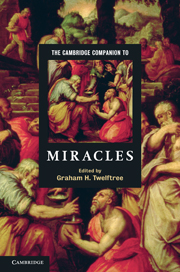Book contents
- Frontmatter
- Introduction
- Part I Fundamental issues
- Part II Miracles in antiquity and the Middle Ages
- 3 Miracles in the Hebrew Bible
- 4 Miracles in the Greek and Roman world
- 5 Miracles in Second Temple and early rabbinic Judaism
- 6 The miracles of Jesus
- 7 Miracles in early Christianity
- 8 Miracles In The Middle Ages
- Part III Miracles and major religions
- Part IV Miracle today
- Index
8 - Miracles In The Middle Ages
from Part II - Miracles in antiquity and the Middle Ages
Published online by Cambridge University Press: 28 May 2011
- Frontmatter
- Introduction
- Part I Fundamental issues
- Part II Miracles in antiquity and the Middle Ages
- 3 Miracles in the Hebrew Bible
- 4 Miracles in the Greek and Roman world
- 5 Miracles in Second Temple and early rabbinic Judaism
- 6 The miracles of Jesus
- 7 Miracles in early Christianity
- 8 Miracles In The Middle Ages
- Part III Miracles and major religions
- Part IV Miracle today
- Index
Summary
An understanding of miracle is central to Christianity but it has always been a point of discussion and argument. At present its meaning is limited by the dictionary definition of the English word miracle: ‘A marvellous event exceeding the known powers of nature and therefore supposed to be due to the special intervention of the deity or of some supernatural agency’. This is to stress its etymology which derives its meaning from the Latin mirare, to wonder. Exclusive stress is thereby laid on that which causes wonder and amazement to us; a miracle is then seen as the subject of divine intervention, contrary to the known laws of nature.
Popular use of the word supports this meaning, which unfortunately suggests that the more that is known about the laws of nature the less room there is for intervention by God. Miracle is then seen as opposed to nature, in terms of inexplicable wonder of the ignorant, but that is not the basic understanding of miracle within the Christian church in the ancient or medieval world. The statement ‘the world is full of miracles’ would not then have meant ‘the constant infraction of the course of this world’ principally because the notion of the law of nature was not used; it would have meant ‘everything created is a wonder issuing from the hand of God’; miracle was seen as sign, stressing theological meaning rather than psychological reaction.
For the thousand years which we call the ‘Middle Ages’ and in every part of the known world, there are records asserting that ‘miracles’ abounded, affecting every part of human life. Through the multitude of records it is clear that for the medieval church there was only one miracle, that of creation, with its corollary of re-creation by the resurrection of Christ. God, they held, created the world out of nothing in six days, and within that initial creation he planted all the possibilities for the future.
- Type
- Chapter
- Information
- The Cambridge Companion to Miracles , pp. 149 - 164Publisher: Cambridge University PressPrint publication year: 2011
- 5
- Cited by

